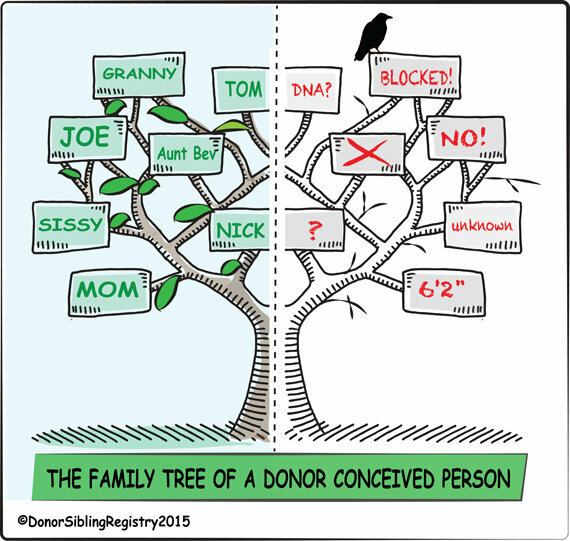
We’ve been hearing disturbing accounts of NW Cryobank threatening donor families for DNA testing. In the past, this sperm bank has also prohibited its donors from using the DSR to make mutual consent contact, thereby prohibiting offspring from learning more about their ancestry, ethnicity, medical backgrounds, and close genetic relatives.
Recently, one mom has been threatened with a $20,000 fine: $10,000 for testing her daughter’s DNA (“seeking the identity of the donor”) and another $10,000 for reaching out to relatives on the DNA website.
Another mom found out via DNA testing that she was given the wrong sperm and was also threatened with regard to reaching out to her child’s genetic relatives on the DNA website. Instead of acknowledging the serious error of shipping the incorrect sperm, the sperm bank instead told the woman that she could not use the DNA connections to try and piece together which donor’s sperm she’d actually been sold. The sperm bank contract prohibits “seeking the identity” of the donor, so apparently, “seeking the identity of” and DNA testing are one and the same to the cryobank.
People around the world test their own or their child’s DNA to find close genetic relatives, to get medical information, and to learn more about ancestry, ethnicity, countries of origin, and to build family trees. Why would donor offspring have fewer rights than any other segment of the population to test their own DNA?
Offspring of all ages are testing their own DNA, sometimes completely unaware that they are donor-conceived and they, along with all other offspring, never signed any type of “agreement” prohibiting mutual consent contact with their biological relatives, via DNA testing or any other methodology. Additionally, when you submit DNA, oftentimes you are told that you’re 25% related; so until you reach out to that relative, you don’t know if it’s a half-sibling, a grandparent, or an aunt or uncle.
Why are these moms being threatened for testing their child’s DNA when so many have already done so and reached out to their unknown genetic relatives? Many formerly anonymous donors welcome the contact, while others choose to say, “thanks, but no thanks.” But you just can’t know if the person that you match with is open to connecting until you actually reach out. Shouldn’t everyone be able to both make and explore their own and their child’s DNA connections?
The sperm bank’s reason for not allowing donors to make mutual consent contact on the DSR was to “protect the parents” and their reasoning for not allowing parents to “seek the identity of the donor” was to “protect” the donor. So it seems like they’re playing both sides of the field: threatening both parents and donors for their own “protection.” In reality, these policies mainly serve the interests of the sperm banks.
“I get the distinct impression they are trying to limit my access to other families since my daughter was born with genetic issues.”
All sperm banks have some sort of a clause prohibiting people from connecting because keeping genetic relatives from each other allows them to continue lying: about numbers of offspring per donor, about “lost” records, about sperm mix-ups, about reaching out to “open” donors, about medical information, etc. All appear to be unenforceable because people have been connecting on the DSR since 2000 — and via DNA and other search methods since at least 2005.
No such lawsuit with a donor who donated through a sperm bank has ever happened. My own son was the first donor-conceived person to locate his donor via DNA testing in 2005. Our sperm bank — California Cryobank, which is owned by the same parent company as NW Cryo — and the sperm banks of many others have never previously threatened people from DNA testing. We assumed that they seemed to understand that they would be trying to shut the barn door on a horse that got out a long time ago. Yet now Califonia Cryobank is also reaching out to parents, trying to enforce the “no DNA testing” rule on donor families of its sister sperm bank, NW Cryo. Why?
CCB’s Agreement: “Client agrees that Client will not, directly or indirectly, through a third party, make any attempt to contact a donor. Client acknowledges that Client has no right to learn the identity of a donor and that Cryobank will not disclose any identifying information regarding a donor. Any donor contact must be facilitated by Cryobank per the Anonymous and Open Donor Contact policies.”
The Donor Sibling Registry currently has 3,570 donors on its website.
Donors from NW Cryobank are also threatened from posting on the Donor Sibling Registry in order to make mutual consent contact with the families. They are the only sperm bank that has not a single donor posted, after one did so in 2007 and was threatened by the sperm bank, and promptly removed his posting.
Sperm banks continue to try and to enforce these self-serving rules to both the people desperate for children and the young college students needing money. For the sake of the offspring, it’s time for both parents and donors to be properly educated and counseled at the front door of the sperm bank or clinic. They need to know about DNA, anonymity, and the importance of making donor family connections, so that they all have the opportunity to make fully educated decisions.


 Browse by Clinic
Browse by Clinic
 Become a Member
Become a Member